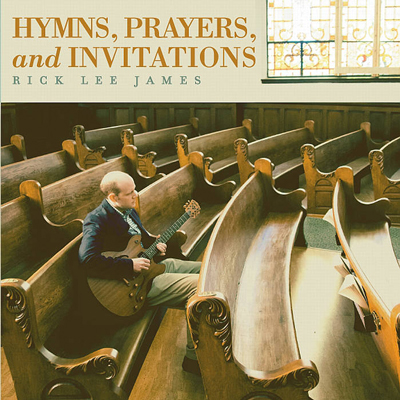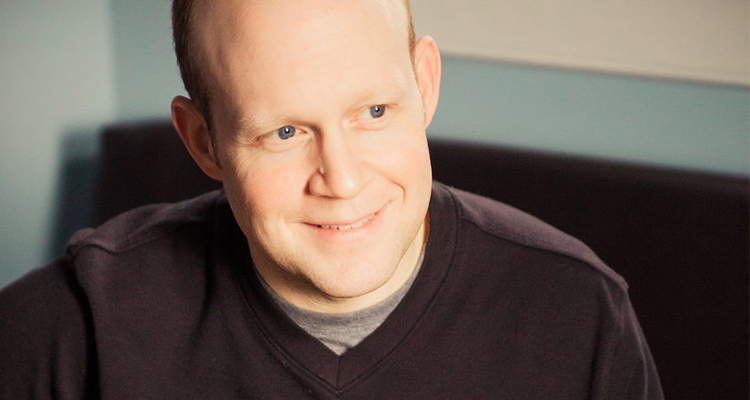With a heart for the hymns and the unique ways in which they communicate God’s message to us, CCM Magazine sat down with worship leader Rick Lee James—as he recently released his Hymns, Prayers, an Invitations project—to glean his perspective on both the importance of the hymns of old and modern worship today. James has keen insight on blending the two, as heard throughout is latest album, but encourages the church to not forget about the hymns that are very much still alive.
 CCM Magazine: In four sentences or less, tell us who Rick Lee James is, and what you do:
CCM Magazine: In four sentences or less, tell us who Rick Lee James is, and what you do:
Rick Lee James: I am a husband, father, singer, songwriter, author, podcast host (Voices In My Head podcast), and a worship leader. In addition to being on staff part-time as a worship pastor at my church in Springfield, Ohio, I also am a guest lecturer at Cedarville University where I teach songwriting. I’m on the road a lot playing concerts, leading workshops, and preaching. I’m also really into guitars, theology, and comic books.
CCM: Who are some of your core musical influences?
RLJ: Early on I was into singers who were also great guitarists like Eric Clapton, Vince Gill, Jimi Hendrix, Ricky Skaggs, Stevie Ray Vaughn and numerous others. In college, I discovered contemporary Christian artists like Steven Curtis Chapman, Rich Mullins and Andrew Peterson. They really became the gold standard for me as a songwriter. As far as worship songwriters go, I really value Paul Baloche, Keith Getty, Stuart Townend, and Chris Tomlin.
CCM: What hymns do you find yourself clinging to during real life situations, and why?
RLJ: “And Can It Be,” by Charles Wesley, is a hymn that I have clung to from an early age. No matter what season of life I’m in, I have always found it to be meaningful. I don’t think I’ve ever led that song anywhere when it hasn’t resonated with the congregation, no matter what their size or style. It might be because of the confidence it instills in the singer with words like, “My chains fell off, my heart was free, I rose went forth and followed Thee.” Other hymns that come to mind are, “Holy, Holy, Holy,” “In Christ Alone,” “Depth Of Mercy,” and “O God Our Help In Ages Past.” I have felt comfort, encouragement, renewed hope, and even conviction in those hymns.
CCM: Who would you consider to be some of our modern day hymn writers, and why?
RLJ: When I think of great hymns I tend to think in terms of their congregational sing-ability, theological insight, and the connection they make with the people who sing them. Keith Getty and Stuart Townend are writers of modern hymns that are proven classics. Their hymns are sing-able for any congregation, they have a rare theological depth, and they evoke something powerful in the hearts of the people who sing them. Lynn DeShazo, Brian Doerksen, Gloria Gaither, Paul Baloche, and Chris Tomlin also have written some powerful modern hymns that I believe will be with our congregations for many years to come.
CCM: Do you think the church in America, as a whole, has forgotten about the importance of the hymns of old? If so, how and/or why?
RLJ: In many ways, yes. While I am a huge fan of the modern worship movement and much of what it has to offer, I fear that we have created an atmosphere where worship leaders feel pressure to make musical choices based on the latest trends. Many worship songs that are only five or six years old have already become outdated and many congregations have traded songs that teach the ancient faith for ones that could be sung about your boyfriend or girlfriend if you replaced God’s name with theirs. I’ve seen many congregations using songs that are trendy and have a lot of artistic merit, but are only vaguely Christian, if at all.
Mumford And Sons would be a good example of this. They are an incredible band, and there may be a place for their music in our worship services, but a steady diet of secular songs in the sacred space might cause us to have somewhat of an identity crisis. Stanley Hauerwas and other faithful theologians have reminded us that the greatest gift we can give to the world is to allow it to be the world. If the church would actually attempt to be the church, and allow the world to be the world, then it might become clear that there is a difference between them. Often congregations are struggling not because they are asking too much of their people but because they are asking too little of them. Hymns require something of us, they take extra effort to learn, but they are also strong enough to lean on during the storms of life. What songs will our people cling to when they are going through a divorce, the death of a loved one, or a dark night of the soul? I have a feeling that hymns of old will be more sustaining in those times.
CCM: Do you think music can play a role in Ps. 46:10 (“Be still…”)? If so, have you and/or how do you incorporate intimate, personal worship in song form as away to “be still?”
RLJ: Psalm 46 is a liturgical song for public worship, a national song known as a “Psalm Of Zion.” It calls the entire nation (kingdom) to wait together. Music can call us to stillness in powerful ways. The stillness that Psalm 46 calls us to is not just silence, but it calls us to wait with attentive ears, as though we are waiting for marching orders from our commander. Music can certainly help us to wait that way. There have been times in my leading when a simple “Hallelujah” was all that was needed as we waited together. In other moments, reflective hymns such as, “I Then Shall Live,” have become part of that waiting process. In music, the rests are just as important as the notes. In faith, the stillness is as important as the action. Sometimes leaders need to just help the congregation wait and listen. Scripture tells us that faith comes by hearing, so if we can remove distractions and help our people to be still enough to hear from God, then we may be on to something. A constant prayer of mine is, “Lord, let some word that is heard be Yours.”
CCM: Any memorable moments, or perhaps worshipful moments that happened during the recording process for Hymns, Prayers, and Invitations?
RLJ: The greatest thrill for me in the studio was to play guitar with one of my guitar heroes, Dave Cleveland. There just aren’t too many players in the world as good as he, and as a person he really makes me want to know Jesus more…that was just really special. The most spiritual moment for me happened when I was recording vocals for a song called “The Invitation.” I co-wrote the song with my friend Andrew Greer while a particular family member was having a really hard time. When I was recording the vocals, his longing and loneliness were on my mind as I sang of God’s invitation, “To every daughter, to every song, to every tribe and every tongue.”
I really messed up the first take because I couldn’t stop welling up with tears of emotion. My producer reassured me that the emotion I was feeling was what we needed to convey on this track—the desperate longing of the heart of God for all of His children to come back to His table. We prayed and had a holy moment together right there in the studio, and I feel like that song ended up being one of the strongest tracks on the whole album. I also really appreciated working with the staff at Lifeway Worship throughout the making of this recording. They are wonderful people and were so encouraging to me in the studio, making sure I had whatever I needed. I’m so grateful that they believe in this album enough to provide congregational resources for every song we recorded. It was a wonderful, worshipful experience from beginning to end, and I feel like the flow on the album very much reflects that.
For more, pleas visit RickLeeJames.com


Leave a Reply
You must be logged in to post a comment.